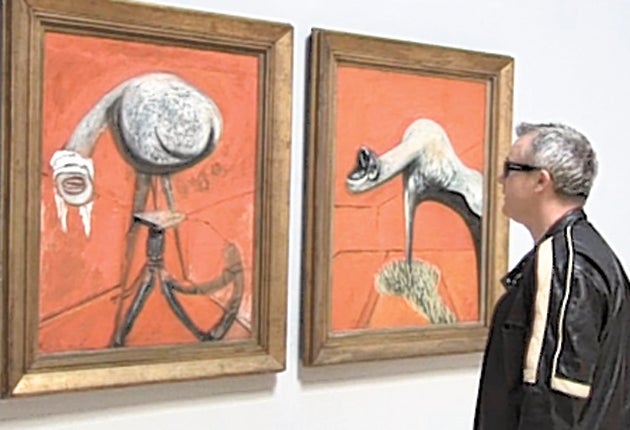Art of the art game: Peter Bazalgette reveals how curators can take control of their own media coverage
Why do galleries invite journalists to sip champagne on opening night?

Your support helps us to tell the story
From reproductive rights to climate change to Big Tech, The Independent is on the ground when the story is developing. Whether it's investigating the financials of Elon Musk's pro-Trump PAC or producing our latest documentary, 'The A Word', which shines a light on the American women fighting for reproductive rights, we know how important it is to parse out the facts from the messaging.
At such a critical moment in US history, we need reporters on the ground. Your donation allows us to keep sending journalists to speak to both sides of the story.
The Independent is trusted by Americans across the entire political spectrum. And unlike many other quality news outlets, we choose not to lock Americans out of our reporting and analysis with paywalls. We believe quality journalism should be available to everyone, paid for by those who can afford it.
Your support makes all the difference.Those who know Peter Bazalgette primarily as the man who brought Big Brother to these shores may not see him as the obvious authority on how the arts can grow its media presence at a time when it is braced for deep cuts. But the former Endemol chairman is the deputy chairman of the English National Opera (ENO) and is excited about the opportunities for arts institutions to bypass traditional media outlets and become programme-makers and broadcasters in their own right.
Such a process is already happening, says Bazalgette, who left Endemol in 2007 to become a digital media investor. "In the last two years, in a quite dramatic way, lots of arts institutions have been creating content. It's what you might call public-service narrowcasting, if I might make that distinction between the arts institutions and the BBC and ITV."
He points to the pioneering work of Tate Media, which produced a 50-minute documentary by the arts director Gerry Fox on the Brazilian artist Cildo Meireles, who was exhibiting at Tate Modern. "They had TV companies asking if they could run it," Bazalgette says. "And when they had their Francis Bacon exhibition [at Tate Britain], they got Damien Hirst to walk round saying what he thought about it and filmed that and stuck it on their website." He described the Hirst idea as being a "classic" format for ITV's The South Bank Show or the BBC's arts strand Imagine.
At the ENO, the artistic director, John Berry, is encouraging cinema directors to turn their hands to opera. In the next six months, Mike Figgis is directing Donizetti's Lucrezia Borgia and Terry Gilliam will direct Berlioz's The Damnation of Faust. "Directors will be making videos which go on our website which are not a video of the opera but about the opera, about the story, about the design approach. It is content spinning off the main thing," says Bazalgette, who will feature his favourite music on Radio 3's Private Passions this Sunday.
He is also impressed with the way the National Theatre and Royal Opera House have led the way in broadcasting their productions live in cinemas. "They're not the same as being in the theatre but they're a live experience, the sound quality is fantastic and the picture is better than what you get sitting in the stalls because you get facial expressions. The camaraderie of the audience is also there and the additional bonus is that there's popcorn, which you don't get at the opera."
Games content is being produced by Tate Media for the Tate website to encourage children to take a virtual tour of the Barbara Hepworth Sculpture Garden. An interactive treasure hunt was made to coincide with the Henry Moore exhibition at Tate Britain.
The ENO is experimenting with apps, having produced one that allegedly teaches you to sing like a diva. "It's not exactly SingStar from Sony PlayStation, but it's an app and a new way of distributing content," he says.
For the next two days, he is working on the Media Festival Arts in north London, which will feature media-content initiatives at smaller arts institutions, such as the Watershed in Bristol. "If you'd had this festival five years ago, you would have heard people queuing up complaining they hadn't been featured on The South Bank Show. Now what they want to do is to learn how to do it better themselves."
Such action is timely. "This is happening against a background of everybody waiting to find out how badly the arts sector is going to be cut," Bazalgette says. "It would be possible for people in the arts, which has been such a burgeoning sector in the last 10 years, to get pretty apprehensive right now. Some organisations will either have to change the way they are funded or draw in their horns. But these sorts of things offer such amazing opportunities. It is a spur to go on exploring, creating and experimenting."
Join our commenting forum
Join thought-provoking conversations, follow other Independent readers and see their replies
Comments